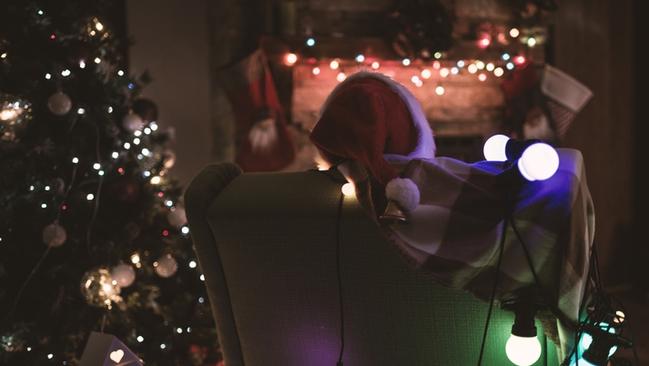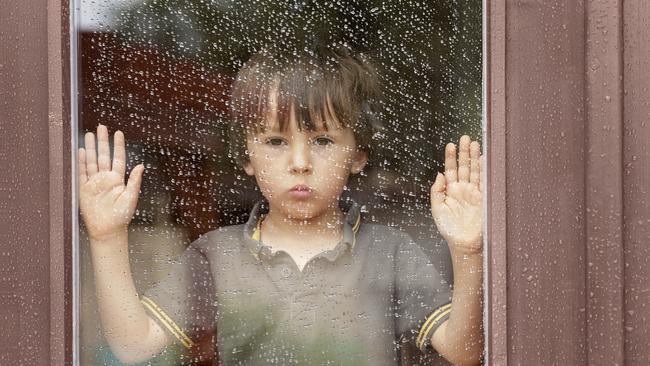Christmas — the blackest, loneliest time of my life
AS my family gathered around the Christmas tree, I sat unresponsive. My darkness shadowed my poor family and I knew no Christmas would ever be the same, writes Jim Mitchell.

Rendezview
Don't miss out on the headlines from Rendezview. Followed categories will be added to My News.
I USED to adore Christmas.
But almost three decades ago, a disturbing event that almost destroyed me changed all that.
It was October 1989, and I was verging on 12-years-old. I had endured a concerted campaign of bullying at school and had all but dropped out, unable and unwilling to face it anymore.
Now, a severe depression was closing in on my mind like a vice.
In November, I stopped eating. Lying in the foetal position, face pressed against the cold concrete wall of my bedroom, all I wanted was to die. My frantic parents rushed me to hospital where I would be “fed” via a nasogastric tube.
As the month progressed, I found myself being shuttled between hospital and a children’s unit where I would spend my days. It was an unsettling place, where kids with disparate mental illnesses and behavioural disorders were lumped together to make a deeply dysfunctional whole.
But it was the only option available at a time when much less was known about childhood depression than it is today. It was a desperate bid by my parents to keep me alive.
In among this terrible turmoil Christmas came, and with it, a 10-day respite from the unit with a stay at home.
As my family gathered around the Christmas tree to open presents, I sat unresponsive, head bowed and eyes closed, occasionally peeking out to get a glimpse of proceedings. It was as if all the colour of that lit, sparkly Christmas tree had been drained. It was grey.
My darkness had already shadowed my poor family with heavy sorrow and distress, and now it had ruined this Christmas too. A lonely entry in my mother’s diary neatly encapsulated the mood: “A sad day. Lunch at home on our own.”
Where once I had revelled in all the joys that Christmas brought, they meant nothing to me now.

I didn’t want them to have meaning. Instead, the “festive” season became a time of foreboding. I knew, come January, I would have to board at the children’s unit, separated from my family during the week. Little did I know that this arrangement would last for some five months.
But damned if I was going to walk willingly in to that twisted place. The nurses would just have to carry me in by hands and feet. This kind of physical protest was my only show of power in a place where my freedom had been taken from me, at a time when my psyche was ravaged.
Staying there at the unit, I experienced some of the blackest, loneliest times of my life.
I have tried to make some sense of what happened to me as a child. I can only put it down to some tragic confluence of bullying, my tendency to bottle things up, a family history of depression, and some catastrophic chemical imbalance.
For the first time, I have read my mother’s diaries, and an exercise book of communication between my mother and the unit’s nursing team I never knew existed. Painful memories of my severe state have flooded back.
At my worst, I was hunched over as if the planet was on my back, shuffling ever so slowly like an old man. I made no eye contact. There was constant crying and anguished screaming. There were episodes of violent rage and intense agitation. I showed little affection towards my family. I had lost the will to speak.
But gradually, I started to show significant signs of improvement. Mostly, and tellingly to me now, much of this occurred when I was at home on weekends. I eventually became a day patient at the unit, and while I was still far from well, being there was hampering my recovery.
In December of 1990 I was finally able to say goodbye to the wretched place.
My family and I then flew out for a much needed holiday to America. That year, Christmas was truly magical. We spent it at Disneyland and as clichéd as it may sound, it really was, at that moment in time, the happiest place on earth after everything that had come before.
But the die had been cast. I would later realise that my reference point for what was once one of my very favourite times of the year, was now that black Christmas of 1989.
When Christmas came in 1995, my family and I were still grieving the sudden loss of my mother five months prior. Mum had instilled in me her infectious love of the festive period, and now she was gone. In my grief, whatever trace of love I had for Christmas had disappeared as well.
In the years that would follow, it wasn’t uncommon for me to spend the day in bed, thick with depression and wishing Christmas away. I wondered if it felt to my loved ones as if, just for that day, they had lost two members of the family.
But my story is just one of many.
There’s a deeply ingrained idea in our culture that Christmas must be a joyful time. Yet, for so many people, Christmas can be one of the hardest times of the year. It brings out the sorrow of past and present circumstance that can’t be airbrushed by a perceived obligation to be happy.
Still, I appreciate that it’s a day to do some of the things I love: spending time with my family, giving presents, eating delicious food.
But these are all special things I can do throughout the year, I don’t need a prescribed day. I said goodbye to Christmas as I knew it years ago, and I’m at peace with that.
If you are experiencing depression or are suicidal, or know someone who is, help is available.
Lifeline: 13 11 44
Beyond Blue: 1300 224 636


